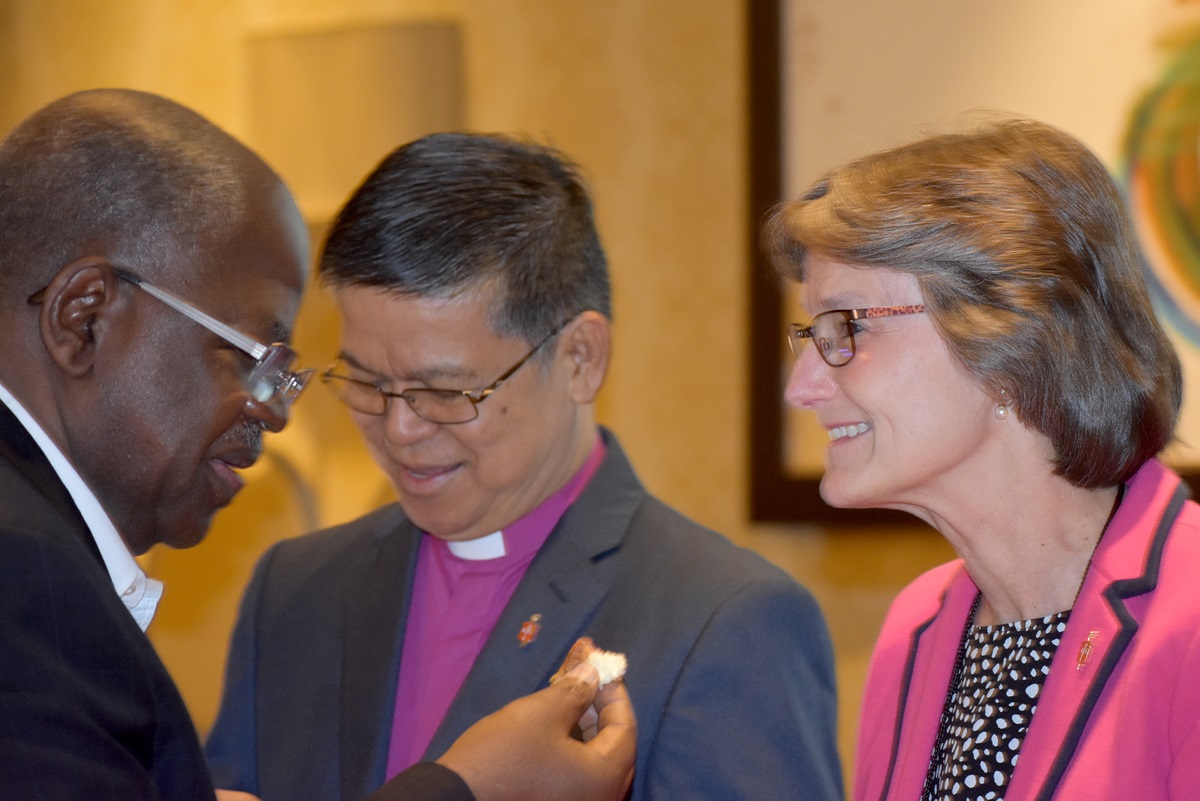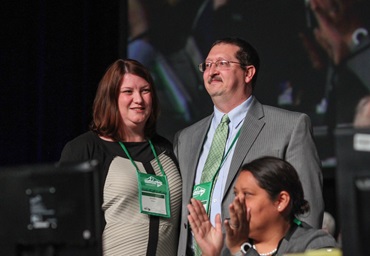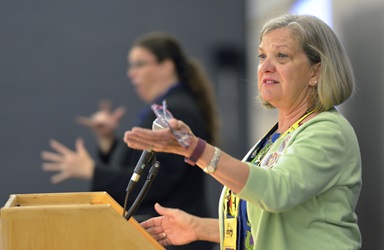The Council of Bishops now has authority to handle complaints against fellow bishops under a newly ratified amendment to the denomination’s constitution.
However, two of the five possible amendments — both addressing the equality of women in the church — fell short of the required support from annual conference voters.
Two amendments that contain more explicit rules around bishop and delegate elections did win the necessary vote.
To be ratified, each constitutional amendment first requires at least a two-thirds majority vote at General Conference, which happened in 2016. Then, each must win at least 67 percent of the total votes at annual conferences around the world. That voting took place in 2017 and early 2018.
The Council of Bishops announced the results on May 7. The bishops canvassed the votes behind closed doors during their meeting April 29-May 4. Bishop Bruce R. Ough, outgoing Council of Bishops president, said he and his colleagues waited to announce the results so they could be released at the same time as a statement on behalf of the council and a pastoral letter from the women bishops.
The breakdown of each annual conference vote can be viewed here.
The three that won ratification take effect immediately. The United Methodist Publishing House plans to issue “Errata” to the Book of Discipline with the new amendments as soon as possible. The Discipline contains the constitution and other church policies and teachings.
The failure of two amendments dealing with gender equality disappointed many at the Council of Bishops’ meeting.
“While we are not completely clear concerning the motivation that caused them to miss the two-thirds required majority by slim margins, we want to be clear that we are unequivocal in our commitment to the equality of women and their full inclusion in our church,” the council said in a statement.
The bishops added they were recommitting themselves as individuals and as a full council to lead “the church toward the goal which Christ has given us to fully include both men and women in the life and ministry of Christ’s church.”
One of the amendments asserted that men and women are equal in God’s eyes and committed the church to ending discrimination against women and girls. The vote for this amendment was 66.5 percent — 31,304 yes and 15,753 no.
The other would have added gender, ability, age and marital status to the list of characteristics that do not bar people from membership in the church. The United Methodist Commission on the Status and Role of Women submitted the amendment, and it also had the support of United Methodist Women, Discipleship Ministries and the DisAbility Ministries Committee. The vote for this amendment was 61.3 percent — 29,049 yes and 18,317 no.
In a pastoral letter unanimously affirmed by the Council of Bishops, the 32 active and retired women bishops noted that the amendment applied to more than women.
“The women of the Council of Bishops recognize that we have much work to do as leaders to foster inclusion in The United Methodist Church,” their letter said. “At the same time as we lament the devaluation of and discrimination against many groups of people in our world, we renew our commitment as United Methodist women bishops to ensure that all people are treated with respect, compassion and grace and that all doors of opportunity and leadership are open to them.”
Bishops’ other actions
In other actions, the Council of Bishops:
- Elected Bishop Hope Morgan Ward, who leads the North Carolina Conference, to deliver the episcopal address at the 2020 General Conference in Minneapolis. With a tight schedule to deal with legislation, the special General Conference in 2019 will not include an episcopal address.
- Learned in a report from the bishops’ Immigration Task Force that United Methodists raised slightly less than $50,000 on Dec. 3 for Global Migration Advance No. 3022144. People can still contribute to the effort. “We know we can do better in terms of our gifts,” said Bishop Minerva Carcaño, chair of the task force and leader of the California-Nevada Conference. “The work will continue for years to come.”
- Joined the top executives of the denomination’s 13 general agencies in singing “Happy Birthday” and enjoying some cake in honor of The United Methodist Church’s 50th anniversary.
Two of the ratified amendments spell out rules that are already in practice in much of the denomination.
An amendment to Paragraph 34 specifies that elections of delegates to General Conference as well as jurisdictional and central conference meetings will include open nominations from the floor at annual conference sessions. The measure also calls for the election of delegates “by a minimum of a simple majority of the ballots cast.” Jurisdictions are in the United States, and central conferences are in Africa, Asia and Europe. The vote for this amendment was 90.3 percent — 42,639 yes and 4,578 no.
An amendment to Paragraph 46 states that central conferences are to elect bishops at a regular, not an extra, session of the central conference “except where an unexpected vacancy must be filled.” The vote for this amendment was 92.9 percent — 43,770 yes and 3,340 no.
Potentially, the most far-reaching change voters approved relates to how the denomination handles complaints against bishops. The vote for this amendment was 81.2 percent — 38,087 yes and 8,828 no.
Currently, complaints against bishops are handled by the college of bishops within the jurisdictions or central conferences where they are elected.
Under an amendment to Paragraph 50, General Conference can adopt provisions for the Council of Bishops “to hold its individual members accountable for their work, both as general superintendents and as presidents and residents in episcopal areas.”
The Western Pennsylvania Conference submitted the amendment to supersede a 1980 ruling by the denomination’s top court, the Judicial Council. That ruling held that it was unconstitutional for the Council of Bishops to hold its members accountable.
While the amendment only enables General Conference to pass legislation, the denomination’s lawmaking body may have done just that in 2016.
The revised Paragraph 413.3 in the Book of Discipline sets a definitive timeline of 180 days for a college of bishops to resolve or refer a complaint. If that doesn’t happen, the paragraph says the matter moves to the Council of Bishops, which then selects a panel from their number to adjudicate the matter.
If the bishop under complaint is from the U.S., the panel has five bishops — one from each jurisdiction. If the bishop is from Africa, Asia or Europe, the panel has three bishops — one from each continent.
The paragraph also now allows the Council of Bishops — at any time in the complaint process, including after a just resolution — to remove a complaint from a college of bishops by a two-thirds vote.
At least two bishops have faced long-running complaints in recent years.
In 2012, the denomination’s General Council on Finance and Administration and Board of Global Ministries filed a complaint against East Africa Area Bishop Daniel Wandabula stemming from three unfavorable audits. That complaint is still unresolved.
Soon after her election in 2016, Mountain Sky Area Bishop Karen Oliveto — the denomination’s first openly gay and married bishop — faced complaints that she violated the denomination’s ban against “self-avowed practicing” gay clergy.
Phoenix Area Bishop Robert T. Hoshibata, president of the Western Jurisdiction College of Bishops, declined to comment on the matter, saying he wanted to respect the confidentiality of the denomination’s complaint process.
Hahn is a multimedia news reporter for United Methodist News Service. Contact her at (615) 742-5470 or newsdesk@umcom.org. To read more United Methodist news, subscribe to the free Daily or Weekly Digests.
Like what you're reading? Support the ministry of UM News! Your support ensures the latest denominational news, dynamic stories and informative articles will continue to connect our global community. Make a tax-deductible donation at ResourceUMC.org/GiveUMCom.




